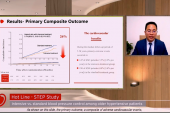AHA Stresses Benefit of Meds, Surgery for Obesity-Related Hypertension
In conjunction with lifestyle changes, new pharmacologic agents can make a promising difference in outcomes, authors say.

When lifestyle modifications, diet, and exercise fail, weight-loss medications and surgeries can be effective in preventing and treating obesity-related hypertension, say experts in a new American Heart Association (AHA) scientific statement.
“Obviously diet and exercise are really the cornerstones; the statement was not intended to say that medications or surgeries should replace diet and exercise,” writing committee chair Michael Hall, MD, MS (University of Mississippi Medical Center, Jackson), told TCTMD. “But we know that only a fraction of people who are eligible either get referred for surgery or are considered for medicines. We're hopeful that clinicians are aware of, number one, the risks of obesity-related hypertension, and that we have a shift to instead of waiting until patients develop target-organ damage, we want to treat upstream.”
The document, published online Monday ahead of print in Hypertension, follows more-general AHA guideline statements related to physical activity, diet, and weight control. It highlights recently published data related to obesity, including studies of the DASH diet, as well as new medical therapies like glucagon-like peptide-1 (GLP-1) receptor agonists such as semaglutide (Ozempic). The writing committee also cites the GATEWAY trial findings showing the safety and effectiveness of bariatric surgery for reducing blood pressure.
“Given the increasing prevalence of obesity and the fact that hypertension is strongly linked to obesity, and the impact they have on cardiovascular disease, we thought it was a good time to update what we know about other options besides diet and exercise,” Hall explained.
He cautioned against looking for a “quick fix” with medications and surgeries, but said they are appropriate after a qualifying patient has already put in the hard work of lifestyle modification. Also, Hall said, while diet and exercise “work for some, they are hard to sustain over the long term.” This is where medications and surgery can complement lifestyle changes in better reducing blood pressure over the long term.
Commenting on the statement for TCTMD, Stephen Juraschek, MD, PhD (Beth Israel Deaconess Medical Center, Boston, MA), said the paper “shines a light” on the importance of the current hypertension epidemic in the US. “Another key feature here with hypertension at large is the fact that there's a huge focus on health disparities, and so we see dramatic differences in the number of people with hypertension and hypertension control rates across distinct demographic groups,” he said. “For these reasons it's very difficult to, at least from the perspective of chronic conditions, ignore the role that hypertension is playing in both the development of cardiovascular disease, but also from the perspective of disparities in health equity.”
Juraschek, who led the aforementioned study on the DASH diet, lauded the statement for specifically highlighting the role of obesity in hypertension. “One of the common misconceptions about nonpharmacologic interventions to lower blood pressure is that it's kind of an either/or—we either focus on the lifestyle or we take medications—and what I think this statement does for me is a nice job of tying the two together,” he said. “What is increasingly apparent is you can treat hypertension with medications, but if you are still eating a lot of high sodium foods, you still have obesity or high body weight, those medications can be less effective.”
Many of the newer pharmacologic weight-loss agents are “exciting” to Juraschek as there haven’t been many developments in this space until recently. For instance, he called semaglutide a “game changer” as it can lead to reduced weight and blood pressure without many side effects. “We may be witnessing for the first time really effective, well-tolerated maintenance therapies for weight loss, which I think is quite exciting,” he said.
Until now, weight has not been considered as important a cardiovascular risk factor as blood pressure to many clinicians, Juraschek observed. “But we know that weight and obesity is upstream to blood pressure and hypertension, so I think it's important to not discard the role that obesity is playing.”
The stigmatization of obesity also still plays a role in how it is treated, he continued. “We don't have that same kind of filter applied toward high blood pressure and high cholesterol, and we are more comfortable with the concept of treating these other risk factors. And I think now . . . there's an opportunity for us to actually treat obesity, and increasingly I think that's the appropriate strategy.”
Looking forward, Hall said he would like to see more research specifically in children and young adults. “We would like to know if you start medications or if you lose weight successfully with medications or surgery before you develop these problems, what's the long-term impact in younger-age individuals but also in adults who don't develop disease?” he said. “A lot of time we just don't refer them until they already have the disease and that's a lot of the clinical trials.”
Additionally, Juraschek said he would like to see more work looking at “pathways linking obesity with cardiovascular disease and injury for us to understand those a little more thoroughly, so some biologic mechanistic research especially now with some of these alternative pharmacologic approaches.” Also, many questions remain about how to further optimize diet with respect to weight and blood pressure reduction as well as about contributors to hypertension during pregnancy, he said.
Yael L. Maxwell is Senior Medical Journalist for TCTMD and Section Editor of TCTMD's Fellows Forum. She served as the inaugural…
Read Full BioSources
Hall ME, Cohen JB, Ard JD, et al. Weight-loss strategies for prevention and treatment of hypertension: a scientific statement from the American Heart Association. Hypertension. 2021;Epub ahead of print.
Disclosures
- Hall and Juraschek report no relevant conflicts of interest.





Comments